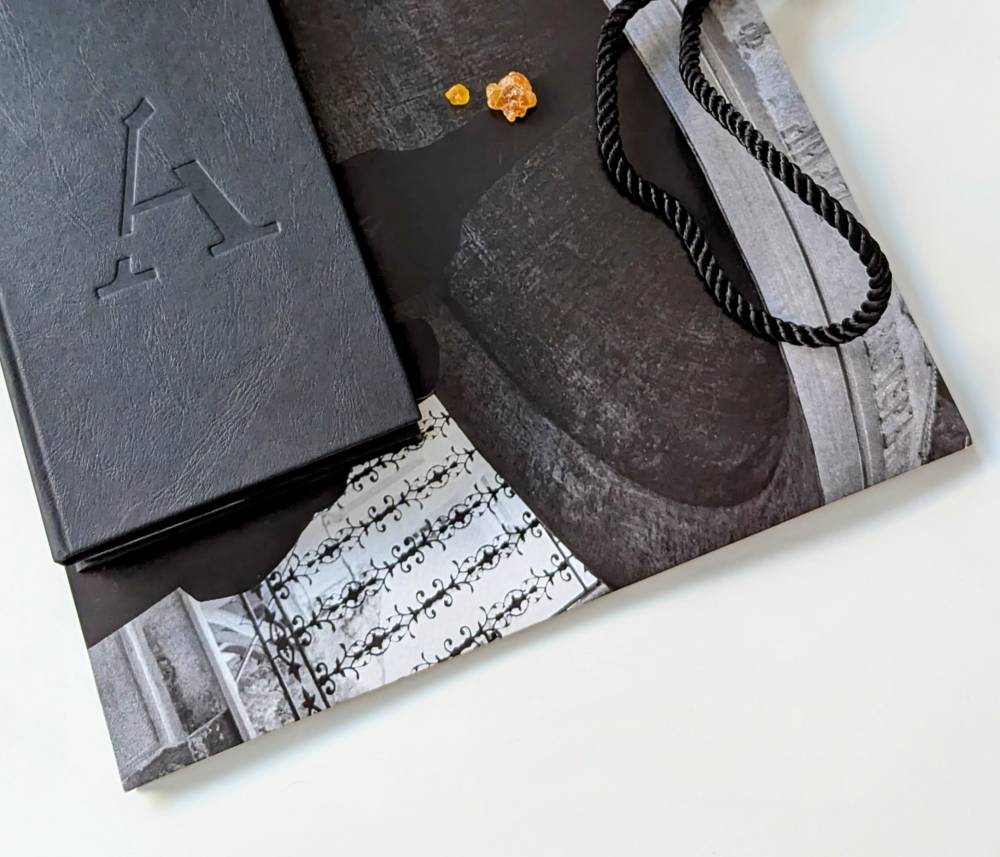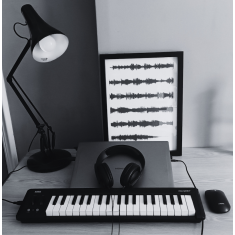Oliver Duport
FLEE Project

I discovered FLEE project at the end of 2022. Behind the idea, was the French Olivier Duport who, in that collection released in February 2023, brought together five artists already known and as well emerging those years, based on the Museum of Ethnography of Geneva. There, participants discovered one of Europe's largest sonic archives, dedicated to field recordings and grouping more than 120,000 entries. And the result? Fantastic! Ethnography and experimentation, brought to the present with the musical ideas of young artists with their own unique aesthetics.
"Front de libération de l'écriture et de l'écoute" = FLEE, a simple acronym or something more? The "Liberating Writing and Listening Front" sounds revolutionary and indeed it is. If one thinks that globalization is interpreted today only in terms of politics and economics, the FLEE project also opens up ways towards the cultural side that is so ignored or neglected on purpose. The clash of cultures brings valuable results and cultural wealth, we know that.
And if a simple observation of these processes is not enough, people behind FLEE are here to challenge the narratives surrounding their oversimplification altogether and highlight the tensions, contradictions and beauty that emerges from these processes.
The new compilation of FLEE project undoubtedly concerns Greece and in fact one of the most mysterious, particular, historical and sensitive part of the ethnography and orthodoxy of our country, the Holy Mount. But how and why did a Frenchman come to collect music and photos related to the peninsula of Athos ? You will discover it all through the very interesting interview he gave to the Basement.
“Athos: Echoes From The Holy Mountain” is released together with a beautiful hardback edition with photos of the mountain, its Monks and moments from their lives there.

“Athos: Echoes From The Holy Mountain” (out 27/9/24)
The songs of the monks from Mount Athos have been echoing for centuries across the deep waters of the Aegean Sea on the fringes of Greece, heard only by the pilgrims who were able to visit this community, secluded from a traditional conception of time and major world events. "Athos : Echoes from the Holy Mountain" aim to present this living heritage bt the means of a 2xLP album and artbook in English, Greek and French, inviting contemporary artists and researchers to approach, revisit and discuss its contemporary implications.
Mount Athos is a peninsula in northeastern Greece, which has been central to Eastern Orthodox monasticism for over a millennium. There, isolated from conventional time as well as global events, live about 2,000 monks, dedicating themselves to prayer and worship. Resonating across the Aegean Sea, their sacred songs have been heard only by visiting pilgrims."Athos : Echoes from the Holy Mountain" seeks to present this living religious and cultural heritage by means of a 2xLP album as well as an artbook (English, Greek and French). It does so by inviting contemporary artists and researchers to revisit and critically reflect upon Athos and what it represents in the 21st century.
The Basement: Hello Olivier! First of all, thank you for giving us the opportunity for this Q&A with you. Please, introduce yourself to us.
When we founded FLEE, the idea was to create something that went beyond just a record label or a publishing house. We wanted to build a platform that could really document and reinterpret these fascinating hybrid cultural phenomena. From the start, we took a transdisciplinary approach, blending music, architecture, history and more, because globalization is complex, and it deserves to be explored from different angles. We’re also committed to making FLEE an inclusive space, where diverse perspectives are not just welcome, but essential. It’s all about creating a dialogue where different disciplines can meet and challenge each other.
The Basement: Let's flash back to 2017. How did you come up with the idea of the FLEE project? Tell us more about how you started it.
FLEE was born out of a realization that many of the narratives around globalization were, frankly, one-dimensional. In our early conversations, we recognized that globalization was almost always discussed in terms of economics and politics, while the cultural dimensions were either oversimplified or ignored altogether. We were frustrated by how much of the mainstream focus missed the real complexity and richness of what happens when cultures collide, blend, and transform.
At first, we thought it might be enough to simply document these hybrid cultural phenomena. But as we delved deeper, we saw that documentation wasn’t enough. There was a need to reinterpret and critically examine these intersections, music, art, architecture and history, through a more nuanced, creative lens. The goal wasn’t just to celebrate globalization's cultural outcomes, but also to challenge the narratives around them and highlight the tensions, contradictions, and beauty that arise from these processes.
FLEE became a platform for doing just that: for breaking down the oversimplified versions of "global culture" and offering a space where multiple, diverse voices could engage with and critique the ways in which globalization shapes, and sometimes distorts, artistic expression and heritage.
The Basement: How did you get related to that part of the music industry? I mean, compilations are not an easy game, it's not for everyone. You need to have a really good reason and motivation to do it.
I mean the main motive was passion as the economical side of it is rather… complicated.
The Basement: Why "FLEE"? Is there a reason you picked up this name?
It started from a wordplay in French. An acronym that would mean something like "Liberation Front of Writing and Listening". We don't like it now looking back but it still kind of fits the mission of FLEE somehow, so I guess it's not too bad after all.
The Basement: Tell us more about the process of song picking for every FLEE compilation. There are so many really good but generally unknown artists among those you cooperate with. How do you find out about them? Are you alone in this wonderful idea?
We are three in FLEE Project together with Alan Marzo and Carl Åhnebrink, and we all choose the artists who contribute jointly. I think it is quite interesting as a process to try and come up with some kind of logic that spans out throughout the whole compilations. It's like creating a super-band every time which is quite exciting in itself. We try to stay alert, bring our own different taste to the table, and there's also the people you meet and conversations that bring new ideas constantly.
The Basement: I am sure you now know about the special significance that the Holy Mountain has for Greece and by extension for Orthodoxy. What was the occasion that led you to get involved with music related to Athos Mount?
Of course, we approached Athos with the utmost respect and tried to separate the liturgical from the profane as much as possible, while having them cohabitate, as happens at times on Athos. I first got interested while coming to Greece and learning more about this peculiar place and we suddenly found ourselves talking with Madeleine Leclair (head of collections at the MEG) about the incredible recordings held by the Museum of Ethnography of Geneva made by Samuel Baud-bovy in the 60s. Some were incomplete and we decided to "finish" them while looking for the original performers on Athos, hence the beginning of our research on the theme.
The Basement: Who took the photos for the Artbook and who edited everything inside? Tell us more about the whole package someone can purchase on Bandcamp.
There are many photographers represented throughout the book. Stratos Kalafatis, Alberto Cameroni, Kostas Balafas, Phaedra Dousing-Bakalaki and myself as well, which allows us to present some incredible takes, old and new, which help to frame the idea of Athos. In general the book and record are made as two pieces of the same ensemble and sold together in a special package made to evoke the black raso dresses of the monks on Athos.
The Basement: Will there be some events around Europe to promote this really special publication of yours? What about Greece?
Yes absolutely, we'll have concerts, talks, lectures, exhibitions throughout all of October and November in Paris, Berlin, London, Geneva, Lyon between others, but also in Greece and Athens in particular where we will be holding a listening session with a small exhibition by Tefra90 and a concert by Eleni Poole at Entropia Records on the 2nd of Oct., a book launch at Addad Books on Oct. 3, a presence at the Athens Art Book Fair from 4/6 October, and finally a live night at Meteoritis and KET on the 9th of October with Jay Glass Dubs and Daniel Paleodimos.
The Basement: Certainly you'll have some great lessons learned from this compilation to share with us. I would love to know the more personal ones.
It's been quite eye-opening to go on Athos to discover this place that feels so out of place. It might feel a bit stupid and obvious but it is a place that reminds you - in my personal opinion - that things are not always as they appear to be.
The Basement: Give us a glimpse of your future plans for FLEE or whatever you'd like to do next.
We're working on a project. Related to the French musical heritage in Louisiana in the US which shall be out by April 2025. Other than that, we have plans to do a project related to Japan, one to India and another to Brazil, all in the next years. Let's see how it goes :)
The Basement: Thank you so very much Olivier and can't wait for more great ideas like this from you!

photo by Kostas Balafas









